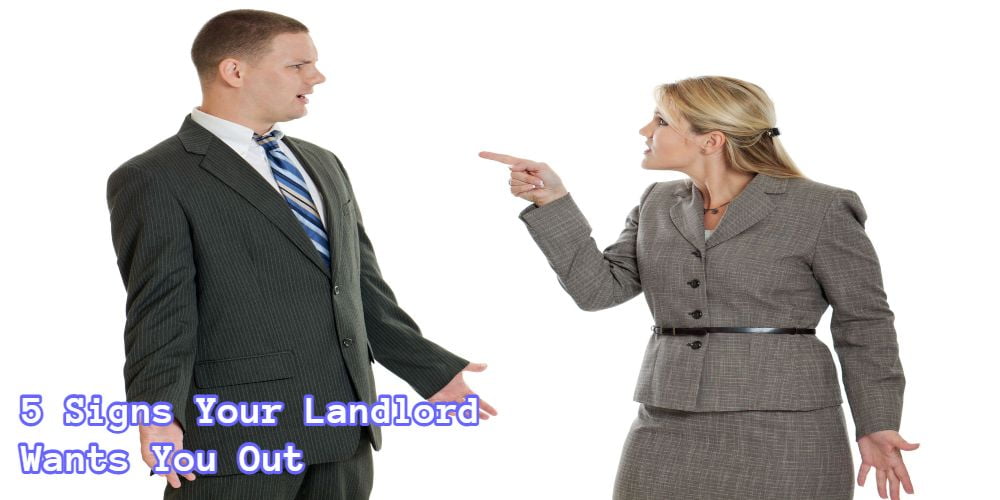Last Updated on October 24, 2021 by Kelvin Nielsen
Is your landlord acting up lately? Is he doing things that are making you uncomfortable as a renter? Well, that could be a telltale sign that your landlord wants you out.
Sign #1: Your landlord is taking longer to fix repair and maintenance issues.
So, have you asked your landlord to fix your fence or even the washing machine and they are a bit hesitant to do it? If they were quick to do it before and now they aren’t, that could be a sign they are tired of you and want you out.
Landlords have a duty to ensure they provide a home that meets all safety, health and structural codes of their state. And this responsibility exists regardless of whether or not it’s mentioned on your lease agreement.
Sign #2: Your landlord is making frequent inspections.
Have the inspections become excessive and unnecessary? Sure, landlords have a right to enter your home to carry out important obligations. They may need to do so when looking for:
- Malfunctioning appliances.
- Issues with the water line, sinks, or toilets.
- Lawn upkeep.
- Broken windows.
- Holes in walls or doors.
- Damaged flooring.
- Pest infestation.
But how often can a landlord do so? Well, different states have different laws in regards to what constitutes excessive rental inspections. At the very least though, expect your landlord to inspect your home at least four times annually. That is, when you first move in, when seasons change, when they may be driving by, and when you finally leave.
That notwithstanding, you have a right to live in quiet and peaceful enjoyment. Most states require that landlords notify their tenants prior to entering their tenant’s units. The entry time must also be within reason.
Sign #3: He’s regularly showcasing the unit to prospective tenants.
This is also another sign that your landlord wants you out. Admittedly, though, landlords have a right to showcase their rental to prospective tenants and even lenders and buyers.
Nevertheless, you have certain rights under a typical lease agreement.
- They must only enter during normal business hours. Let him schedule times that work better for you.
- They must notify you beforehand. Most states require that a landlord serve their tenant with reasonable notice before entry. A 24 hour notice is typical.
- Require the landlord to include showing terms in your lease. Protect your privacy rights by having the landlord write down the specifics in the agreement. This will help eliminate any surprises later on.
Sign #4: He has raised rent.
Rent increases are an inevitable part of any tenant’s life. In states without rent control laws, landlords have a right to pretty much raise rent by whatever amount they want.
That being said, you have some rights when it comes to rent raises. For one, your landlord can only do so after the lease has ended for fixed-term agreements. He or she doesn’t have to notify you of the rent raise.
By contrast, though, proper notice is needed in a month-to-month rental agreement. In most states, your landlord must provide you a notice of at least 30 days.
Sign #5: Your landlord is trying to evict you by putting fake eviction notices.
As a tenant, you have a right to remain in your rented premises until the landlord has followed proper eviction procedure. And even so, your landlord must have a good reason to do so. They cannot just wake up one day and decide to kick you out.
Common reasons for tenant eviction include:
- Nonpayment of rent.
- Gross violation of the lease terms, like subletting without permission or keeping an unauthorized pet.
- Causing excessive property damage.
- Engaging in illegal activities while at the rental premises.
- Refusal by the tenant to leave after the lease expires.
Other than these, your landlord will have no other option but to wait until the lease expires for you to move out on your own.
Matter of fact, you can even sue your landlord for landlord harassment if they try to evict you in an unjustified way.
By and large, these are the 5 telltale signs that your landlord wants you out. They are meant to make you as uncomfortable as possible so as to make you leave on your own. To better protect yourself, understand your rights as a tenant and seek legal help whenever necessary.

Hi, I’m Kelvin Nielsen, an experienced landlord and accomplished real estate lawyer. My focus is on answering your questions about renting in the hopes of making your life as a renter or a landlord a bit easier.







